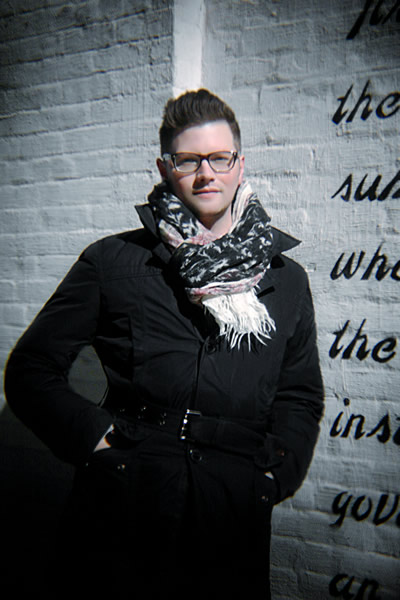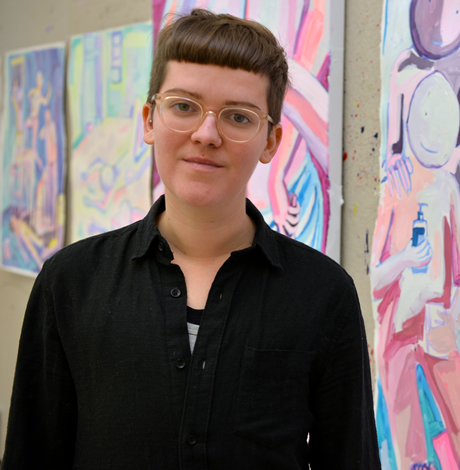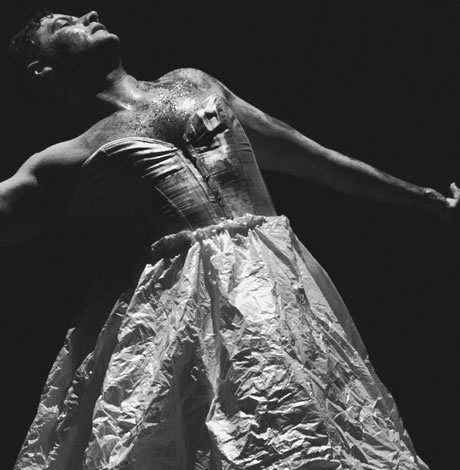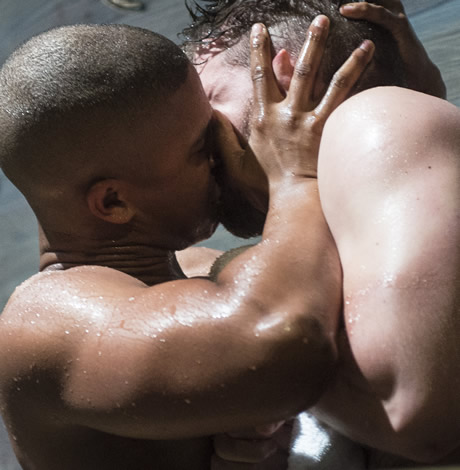Arts & Entertainment
Queery: John Moletress
The theater visionary answers 20 gay questions

Local theater regulars know former actor John Moletress’s name. But like many creative types, he’s grown restless and is pursuing new artistic vistas. Last summer he started force/collision, an interdisciplinary performance ensemble based in Washington. It kicked off with a piece called “Collapsing Silence” at the Source Theatre. Next month his company will unveil “The Nautical Yards,” a 60-minute site-specific show at the Washington Navy Yard that will tell of two lovers separated by war and sea.
“I think it’s important that we create a large script between the arts and work more holistically,” the 34-year-old Pottsgrove, Pa., native says. “I’ve worked in traditional theater forms, been in lots of plays and musicals, but when we band together it opens up the door to explore different forums and takes us into the next generation of making art together.”
Moletress says some of the traditional forms feel somewhat exhausted to him.
“When you run out of a way to tell a story by speaking it, I think there are other ways to do it,” he says. “Like with dance … when you run out of words, there’s a certain collective memory our body has that we can share with movement. Our bodies become storehouses for our memories.”
Moletress studied acting in college, both in Allentown, Pa., and during graduate school at the University of Tennessee. He spent two years in London in the ‘90s studying acting and modern dance and worked in regional theaters around New York City where he lived in the early ‘00s. He came to Washington in 2008 after two years working as an artistic director at a company in Pennsylvania. In 2009, he started Factory 449, a Helen Hayes-winning project from which he’s since parted ways. Force/collision (force-collision.org) was started with a grant he got through Source Theatre.
Moletress lives in D.C.’s Navy Yard area and enjoys reading — “I have hundreds of books in my apartment” — and decoupage in his free time. (Photo courtesy Moletress)
How long have you been out and who was the hardest person to tell?
Pretty much since high school. Before the Grindr phenomena, we had AOL chat rooms. It was a fun little platform for meeting other high school guys who were for the most part, not out. I can’ t say I really made the choice to come out, so much as outed myself with a crumpled up page ripped from an International Male catalogue I left in my pants pocket. My mother was doing laundry that day. I don’t think she was really surprised, given that my early obsessions included Cheryl Tiegs workout videos and musical theater.
Who’s your LGBT hero?
Christopher Isherwood.
What’s Washington’s best nightspot, past or present?
Does my couch count? Honestly, wherever my friends are. I adore them.
Describe your dream wedding.
No, thank you. Although if I ever found myself wearing a white dress, I’d most likely be standing on a cliff somewhere on the Galway coast of Ireland, contemplating two choices.
What non-LGBT issue are you most passionate about?
Genocide and reconciliation. My friend, Erik Ehn, is a playwright who founded an annual conference to investigate theatre on this subject. He writes about collective trauma. I’ll be directing the premiere of his new play “Shape” which infuses the stories of blacks in 1900 Ambrose Park with the 1921 Tulsa Race Riot.
What historical outcome would you change?
This is a challenging question. I believe we are where and who we are because of our histories. I would negotiate peace and dialogue before violence.
What’s been the most memorable pop culture moment of your lifetime?
Manic Panic hair dye and Siouxsie Sioux on high school Sundays with like-minded outcasts.
On what do you insist?
Pausing and breathing. Oh, and Diet Pepsi.
What was your last Facebook post or Tweet?
@soulographiedesignmeetings at The New Schoolpic.twitter.com
If your life were a book, what would the title be?
I’d have to look to Jackie Collins for inspiration. Perhaps, “The World Is Full of Married Men” or “Lady Boss.”
If science discovered a way to change sexual orientation, what would you do?
Either run screaming or mount Tom Brady.
What do you believe in beyond the physical world?
Connectivity. Universal law. Energy and frequency. Love.
What’s your advice for LGBT movement leaders?
Persevere. Trust your instincts. If one door closes, open another.
What would you walk across hot coals for?
My friends. To have seen Velvet Underground perform live.
What LGBT stereotype annoys you most?
I’m sure I pretty much fit all of them at one point or another. However, I wish we could all be more open to the possibilities of gender duality. Regardless of whether people think I swing more toward my feminine or my masculine side, nothing turns me off more than men who state they are “straight acting” when they like to play leap frog with other men.
What’ s your favorite LGBT movie?
“Mommie Dearest.” The gay man’ s guide to opera acting and OCD.
What’s the most overrated social custom?
Utensils.
What trophy or prize do you most covet?
Bjork’s Polar Music Prize. I wish I could be as brilliant as her.
What do you wish you’d known at 18?
That I was going to live past 25. I certainly didn’t behave that way.
Why Washington?
I’m attracted to the sizzle of American politics. The Hill staffers are cute, too. I dated one for a while. Moreover, this IS a theater town and the resources here for my profession are overwhelming. Source Theatre/Cultural Development Corporation has played an integral part in getting my work seen. I owe a lot to them, especially Jenny McConnell Frederick.
Television
ICYMI: ‘Overcompensating’ a surprisingly sweet queer treat
A sweet, savvy show about breaking free to embrace your true self

Pride month 2025 is now behind us, and while it’s safe to say that this year’s celebrations had a darker edge than usual, it’s also true that they came with a particularly rich bounty of new queer movies and shows to entertain us – so many, in fact, that even if we are facing a lull until the fall another harvest of fresh content, there are still plenty of titles – which, for whatever reason, were off your radar – for you to catch up on in the meantime.
One of the most notable of these – the bingeworthy series “Overcompensating” (now streaming on Amazon Prime) – will most definitely have been ON the radar for the plentiful fans of creator and star Benito Skinner, the actor/comedian who rose to viral fame through his content on platforms like Instagram, YouTube, and TikTok. For anyone else, it might have easily slipped through the cracks.
Created and written by Skinner as a loosely autobiographical “college comedy,” it aims for the kind of raucous, explicitly sexed-up tone one expects from the genre as it centers on Benny (Skinner), newly arrived as a freshman at prestigious Yates University. A former football jock and “golden boy” at his midwestern high school, he’s the picture of idealized youthful masculinity; he’s also deep in the closet, struggling to keep his sexuality hidden and maintain his macho front under the intense scrutiny of the college’s social scene – and under the resentful eye of his older sister Grace (Mary Beth Barone), who has already secured her own place at the top of the pecking order.
In the first episode, Benny’s difficulties are eased when he meets Carmen (Wally Baram), another freshman trying to navigate the politics of college life; a gamer from a home marred by tragedy, she’s an outsider who feels like she’s putting on an act, too, and they click – giving him the convenient “cover” of female companionship while providing them both with much-needed support and encouragement. He’s also befriended by a handsome film major from England (Rish Shah), who has already caught his eye, stirring other kinds of feelings and possibly even reciprocating them. Meanwhile, he’s being courted by the school’s “exclusive secret society” – headed by his sister’s aggressively “alpha” boyfriend Pete (Adam DiMarco) – and trying to stay interested in his studies, despite a growing realization that a career in business doesn’t actually appeal to him all that much.
That’s a lot to juggle for anybody, even an overachiever like Benny – whose “lucky” life so far has largely been the result of playing a role he is finding harder and harder to maintain. As the series goes on through its eight-episode arc, it becomes clear that he’s not the only one who is “keeping up appearances,” and he, along with the other confused and damaged young people in his orbit, begins the painful (but often hilarious) process of evolution that is required in order to become truly oneself.
Directed toward appealing to a younger demographic, “Overcompensating” is the kind of show that requires a few episodes worth of invested time to make an impression that feels like substance. Full of the bawdy farcical antics that go hand in hand with stories about hormonally charged college kids, it’s not above leaning into the formulas and tropes that have always driven these kinds of comedies. At first, while its broadly comedic strokes and frequently explicit sexual hijinks might elicit plenty of chuckles, the show might easily feel tiresome for more mature audiences; there’s a nostalgic fun to it, made even more appealing, somehow, by the “political incorrectness” of its frequently sexist and homophobic humor, but for a while things may feel like an unnecessary attempt to reinvent “Animal House” for the Gen Z crowd.
By the time the season reaches its halfway point, however, things have started to get real. The antics of these horny almost-adults take on a more pointed absurdity, informed by the increasingly tangled web of defensive deceit they weave among themselves – and, as things draw toward a cliffhanger climax, the consequences of maintaining it – until it achieves a sense of empathy toward them all. There’s a wisdom that smacks of lived authenticity underlying the whole affair, transforming it from the “sexploitative” teen comedy of its surface into something deeper. To be sure, things stay expectedly wacky, and the soap-operatic melodrama of its twists and reversals continue to maintain the show’s “mature YA” appeal; but beneath those trappings, by the end of the season a truer identity has begun to emerge, just as its characters have begun to find their own levels of self-actualization for themselves.
As creator, primary writer, and star, it’s obviously Skinner who deserves much of the credit. While it might be tempting, early on, to dismiss the show as an “ego project,” the internet-spawned sensation proves his talents quickly enough to get past such judgy suspicions, delivering a pitch-perfect blend of sauciness and sensitivity that extends its appeal toward both ends of the taste spectrum; just as crucially, he brings the same aforementioned “lived authenticity” to his winning performance – after all, he’s essentially playing himself in a fictionalized version of his own life – while also making sure that equal time (and compassion) is afforded all the other characters around him, each of whom are pushing at the boundaries of their own respective “closets,” too. It’s unavoidable to notice that – like most of his co-stars – he’s plainly a decade too old to be playing a college student; but by the time we reach that crucial halfway turning point, we’ve become too engaged by him to care.
The show is full of excellent performances, in fact. Relative newcomers Baram and Barone offer layers of complex nuance, while the more familiar DiMarco (“White Lotus”) is close to heartbreaking as the toxic BMOC clinging to the illusion of power as his life begins unraveling around him. Other standouts include the mononymic actress Holmes as Carmen’s “wild child” roommate, solidly likable turns as Benny’s parents from mature veterans Connie Britten and Kyle MacLachlan (whose presence, along with stylish elements in several key scenes, hints at an homage-ish nod to the late David Lynch), and podcaster Owen Thiele as an openly gay fellow student who has Benny “clocked” from the moment they meet. Finally, Lukas Gage makes a deep impression as a former high school teammate at the heart of Benny’s most haunting memory.
There’s no official word yet on whether “Overcompensating” will be renewed for a second season, despite the multiple loose ends left dangling at the end of its first; it has proven to be popular, and Skinner’s large fanbase makes it likely that the story will continue. Even if it doesn’t, the place of uncertainty in which it has left its characters rings true enough to serve as a satisfying endpoint.
As for us, we hope that won’t happen. For all its sophomoric humor, generic plot twists, and purposefully gratuitous sexual titillation, it’s one of the sweetest, kindest, and most savvy shows we’ve seen about breaking free from conformity to embrace your true self – and that’s a message that applies whether you’re queer, straight, or anywhere in between.
Photos
PHOTOS: Independence Day Weekend in Rehoboth
Wicked Green Pool Party, fireworks among festivities

Vacationers and residents alike enjoyed Independence Day Weekend activities in Rehoboth Beach, Del. The Wicked Green Pool Party drew hundreds to the CAMP Rehoboth fundraiser on Saturday. That evening, revelers went to the rooftops to watch the fireworks display.
(Washington Blade photos by Daniel Truitt)













Music & Concerts
Red, White, and Beyoncé: Queen Bey takes Cowboy Carter to D.C. for the Fourth of July
The legendary music icon performed on July 4 and 7 to a nearly sold-out Northwest Stadium.

Just in time for Independence Day, Beyoncé lit up Landover’s Commanders Field (formerly FedEx Field) with fireworks and fiery patriotism, bringing her deeply moving and genre-defying “Cowboy Carter” tour to the Washington, D.C. area.
The tour, which takes the global icon across nine cities in support of her chart-topping and Grammy-winning country album “Cowboy Carter,” landed in Prince George’s County, Maryland, over the Fourth of July weekend. From the moment Beyoncé stepped on stage, it was clear this was more than just a concert — it was a reclamation.
Drawing from classic Americana, sharp political commentary, and a reimagined vision of country music, the show served as a powerful reminder of how Black Americans — especially Black women — have long been overlooked in spaces they helped create. “Cowboy Carter” released in March 2024, is the second act in Beyoncé’s genre-traversing trilogy. With it, she became the first Black woman to win a Grammy for Best Country Album and also took home the coveted Album of the Year.
The record examines the Black American experience through the lens of country music, grappling with the tension between the mythology of the American Dream and the lived realities of those historically excluded from it. That theme comes alive in the show’s opening number, “American Requiem,” where Beyoncé sings:
“Said I wouldn’t saddle up, but
If that ain’t country, tell me, what is?
Plant my bare feet on solid ground for years
They don’t, don’t know how hard I had to fight for this
When I sing my song…”
Throughout the performance, Beyoncé incorporated arresting visuals: Black cowboys on horseback, vintage American iconography, and Fox News clips criticizing her genre shift — all woven together with voiceovers from country legends like Dolly Parton and Willie Nelson. The result was a multimedia masterclass in storytelling and subversion.
The “Cowboy Carter” tour has been a social media sensation for weeks, with fans scrambling for tickets, curating elaborate “cowboy couture” outfits, and tailgating under the summer sun. At Commanders Field, thousands waited in long lines for exclusive merch and even longer ones to enter the stadium — a pilgrimage that, for many, felt more like attending church than a concert.
One group out in full force for the concert was Black queer men — some rocking “denim on denim on denim on denim,” while others opted for more polished Cowboy Couture looks. The celebration of Black identity within Americana was ever-present, making the concert feel like the world’s biggest gay country-western club.
A standout moment of the night was the appearance of Beyoncé’s 13-year-old daughter, Blue Ivy Carter. Commanding the stage with poise and power, she matched the intensity and choreography of her mother and the professional dancers — a remarkable feat for someone her age and a clear sign that the Carter legacy continues to shine.
It’s been nearly two decades since Beyoncé and Destiny’s Child parted ways, and since then, she’s more than lived up to her title as the voice of a generation. With “Cowboy Carter,” she’s not just making music — she’s rewriting history and reclaiming the space Black artists have always deserved in the country canon.
-

 Federal Government2 days ago
Federal Government2 days agoTreasury Department has a gay secretary but LGBTQ staff are under siege
-

 Virginia3 days ago
Virginia3 days agoDefying trends, new LGBTQ center opens in rural Winchester, Va.
-

 District of Columbia2 days ago
District of Columbia2 days agoGay GOP group hosts Ernst, 3 House members — all of whom oppose Equality Act
-

 Opinions4 days ago
Opinions4 days agoUSAID’s demise: America’s global betrayal of trust with LGBTQ people










